Israeli VR tech companies assist strained US healthcare system
Start-ups InceptionXR and Gaitbetter focus on preventive care solutions

Israeli start-up companies specializing in virtual reality (VR) technologies are providing a strained American healthcare system with a cost-effective solution.
Like much of the world, the Unites States healthcare network is facing a growing shortage of registered nurses. Prior to the COVID pandemic, the World Health Organization (WHO) estimated a global shortage of almost 6 million nurses.
The situation deteriorated further during the pandemic, with the shortage expected to potentially reach 13 million by 2030 unless the issue is urgently addressed. As the world’s third most populous country, the U.S. alone is expected to need an additional one million nurses by 2030.
“We are in one of the worst staffing crisis that we’ve been in,” said Mary Jessee, assistant dean of Academics at the Vanderbilt School of Nursing in Nashville, Tennessee.
“All of the challenges that the global pandemic brought really wreaked havoc on the emotional and mental health of a lot of nurses, causing many to leave the profession," she told The Media Line.
While there is a real need for more nurses, training them is both expensive and time consuming and this is where VR companies are able to make a positive impact.
Tel Aviv-based start-up InceptionXR was established in 2016 and focuses on VR technology designed to prevent hospital-related infections.
InceptionXR’s VP of Sales and Business Development Ariel Geva believes the pandemic raised global awareness concerning infection prevention.
“COVID made it very clear how important it is to avoid infection,” Geva stated.
He stressed that infection prevention is done within the wider context of training nurses in a realistic patient environment.
“Our aim and our partners’ (aim) is to reduce the number of infections while training the nurses how to act in a room with a patient.”
Geva concludes that VR technology could effectively assist overworked nurses who have limited time.
“Nurses work very hard, (but) they have very limited time to do any activities, and they probably make many mistakes during this time. Bringing them into a simulation that makes them think about infection...will just make them think about it when they go to the room to treat patients,” he said.
GaitBetter is another Tel Aviv-based startup seeking to address the growing challenges of faced by an aging population in the West and other parts of the world. The company focuses on preventive care with a specific emphasis on preventing the elderly from suffering falls.
“By adding cognitive aspects to gait exercise, they can significantly improve outcomes and significantly reduce risks of falls, GaitBetter CEO Hilik Harari stated.
Israel is known today as the Start-Up Nation due to the high concentration of start-up companies in the Jewish state. Due to the small size of the domestic Israeli market, companies usually focus on the international market, including the U.S. and other large-potential markets.
“We naturally try to aim for the U.S. market, because the Israeli market is just too small for a business to raise money or to be attractive enough,” concluded Geva.
The Tel Aviv metropolitan area is the center of the Start-Up Nation.
Tel Aviv University (TAU) recently ranked as the top non-U.S. unicorn breeder, according to a Stanford University study. A unicorn is defined as a startup company valued at more than $1 billion.
TAU's Director of Entrepreneurship and Innovation Prof. Moshe Zviran said Israel and especially the university, has achieved a prominent position in the start-up field due to its strong focus on innovation and entrepreneurship.
"We have achieved this status because we welcome the best students in a wide range of disciplines, and also because in recent years we have become proactive in the spheres of entrepreneurship and innovation," Zviran said.

The All Israel News Staff is a team of journalists in Israel.














